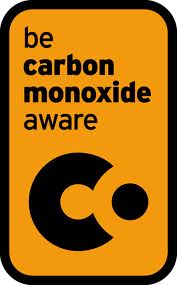Carbon Monoxide & Solid Fuel

Oil, Gas and Solid fuel Appliances
Please click the relevent tabs below to assit you with CO” regarding Oil, Gas and Solid fuel Appliances
When buying an oil or gas appliance, deal with a reputable outlet. Every new appliance is supplied with a full instruction book, essential to the correct and safe use of the appliance. Insist that the appliance installer gives you an instruction book. Read it carefully and get to know your appliance. Keep the instructions handy. If you are moving house leave the instruction book for any appliance you are not taking with you (contact your appliance supplier if you need a replacement instruction book).
All appliances should be serviced and checked for safety annually to make sure they are working safely and efficiently. If you’re concerned that an appliance is not operating safely, or

that the installation in your house is not in good condition or unsafe then have a safety inspection conducted
.
Please click the relevant tabs below to assist you with CO2 regarding Oil, Gas and Solid fuel Appliances[cc_collapse name=”collapsit”]
[cc_collapse_tab name=”collapse-tab1″ label=”Chimney“]Have your chimney swept regularly as they can become blocked over time. The nesting of birds in the chimney may cause a blockage preventing the products of combustion from the fire leaving the building. It is recommended that Crow Guards are fitted on all chimneys with gas fires fitted prior to 1996. These older fire types may not have the additional safety features which turn off the gas fire in such circumstances. Consideration should also be given to the fitting of at least a Crow Guard for chimneys for solid fuel fires and all fossil fuel appliances connected to an open chimney in order to protect against the blocking of the chimney by nesting birds.[/cc_collapse_tab][cc_collapse_tab name=”collapse-tab2″ label=”Wood Pellet Boilers“]Wood Pellet Boilers are commonly used in homes and businesses as an alternative to the oil or gas fired boilers. Wood pellets, the fuel source for these units are normally housed in a large sealed hopper/tank that is either fitted with screw feeder (auger) connected to the boiler, or the hopper/tank is mounted over the boiler for gravity feeding. Due to the enclosed nature of these hoppers/tanks the atmosphere inside can become oxygen depleted and a toxic atmosphere can accumulate. All operators, maintenance personnel and users of this equipment need to ensure the following;
DO NOT ENTER or place your head into the wood pellet hopper under any circumstances. The unit can contain toxic gases.
Ensure that your wood pellet hopper/tank and boiler has been installed and commissioned by a competent person.
If in doubt, contact the supplier and/or manufacturer and request assistance.
Ensure that the boiler is cleaned and serviced by a competent person at the frequency required by the manufacturers’ instructions.
If any problems are encountered with the unit, such as, system not heating correctly, flue gas is flowing into boiler room, turn unit off and seek assistance immediately.
No personnel should enter the hopper/tank unless fully trained and competent in confined space entry procedures. The hopper/tank should be fully ventilated and controls put in place to ensure safe entry as per the HSA Code of Practice “Safe Work in Confined Spaces”.
Ensure boiler room is well ventilated at all times to ensure no inadvertent build up of toxic gases.
[/cc_collapse_tab][cc_collapse_tab name=”collapse-tab3″ label=”Barbecues“]Barbecues have been linked to campsite deaths caused by carbon monoxide poisoning. If you’re planning on using a barbecue, whether it’s a disposable one, gas or charcoal make sure you keep yourself safe and don’t put yourself at risk of carbon monoxide poisoning. Follow these top tips for barbecue safety:
Never take a smouldering or lit barbecue into a tent, caravan or cabin. Even if you have finished cooking your barbecue should remain outside as it will still give off fumes for some hours after use.
Never use a barbecue inside to keep you warm.
Never leave a lit barbecue unattended or while sleeping.
Only use appliances in accordance with the operating instructions.
Place your cooking area well away from your tent. Always ensure there is an adequate supply of fresh air where the barbecue is being used.
[/cc_collapse_tab]
Solid Fuel Appliances and Carbon Monoxide
Please click the relevant tabs below to assist you with Solid Fuel Appliances and Carbon Monoxide
[cc_collapse_tab name=”collapse-tab4″ label=”Mobile Gas Heaters (L.P.G.)“]The use of mobile heaters which are damaged can result in the production of Carbon Monoxide. In particular if the plaques or bricks at the front of the heater are damaged, or the retaining cement is missing, they should be immediately replaced by a competent person. The heater should not be used in a damaged condition. For further details on safety checks for mobile gas heaters click here.
Safety alert on New World Vision gas cookers
The New World Vision 50TWLMSV (LPG) gas cooker can produce dangerous levels of carbon monoxide if not operated in accordance with the manufacturer’s instructions. For further information on this and other New Wold Vision 50TWL models affected and the required safety actions click here.
Safety Alert on certain Beko, Flavel and Leisure gas cookers
A similar safety alert was issued for certain Beko, Flavel and Leisure cooker models. If the cooker grill is operated with the grill door closed, production of Carbon Monoxide can occur. Not operating these appliances in accordance with the user instructions can pose a serious risk to your health.
[/cc_collapse_tab]
[cc_collapse_tab name=”collapse-tab5″ label=”Natural Gas“]Do you have an unsafe water heater?
Flueless gas water heaters are considered dangerous because they consume the air inside the room. This causes the products of combustion – including toxic Carbon Monoxide – to discharge directly into the room where the heater is fitted. If used for extended periods, the levels of Carbon Monoxide can build up to dangerous levels if there is a lack of ventilation. Open flue-type water heaters located in bathrooms are also considered unsafe. If you think you may have an unsafe gas waterheater contact Bord Gáis Networks now on 1850 79 79 79
for a free safety check.
Do you have a gas boiler which previously ran on oil?
In the past, existing oil boilers were modified to operate on natural gas. This was achieved by replacing the oil burner on the unit with a gas burner, with the old boiler casing and heat exchanger being retained.
If you think you might have such an appliance contact Bord Gáis Networks on 1850 79 79 79 for a free safety check.
Have you got a Declaration of Conformance?
The domestic installation standard I.S. 813 requires that natural gas installers provide you with a certificate confirming that the gas installation work was carried out in conformance with the standard and is safe to use. This is an important document, so keep in a safe place.
Going on Holidays?
If you go on holidays make sure your appliances are turned off. However, in very cold weather your central heatin
g boiler can be left operating at a low setting in order to prevent water pipes from freezing.[/cc_collapse_tab]
Bord Gáis Networks contact number: 1850 79 79 79 Lines open: 8am to 8pm Monday to Friday. 9am to 5.30pm Saturday
| PPM | Time | Effect |
| 50 | Threshold Limit – No apparent toxic limit | |
| 100 | Several Hours | No symptoms for long periods |
| 200 | 2-3 Hours | Possible headache |
| 400 | 1-2 Hours | Frontal headache and nausea |
| 800 | 45 Minutes | Headache, dizziness and nausea |
| 800 | 2 Hours | Collapse and possible unconsciousness |
| 1600 | 20 Minutes | Headache, dizziness and nausea |
| 1600 | 2 Hours | Collapse, unconsciousness, possible death |
| 3200 | 5-10 minutes | Headache and dizziness |
| 3200 | 10-15 Minutes | Unconsciousness and possible death |
| 6400 | 1-2 Minutes | Headache and dizziness |
| 6400 | 0-15 Minutes | Unconsciousness and possible death |
| 12800 | Immediate | Unconsciousness |
| 12800 | 1-3 Minutes | Danger of death |
